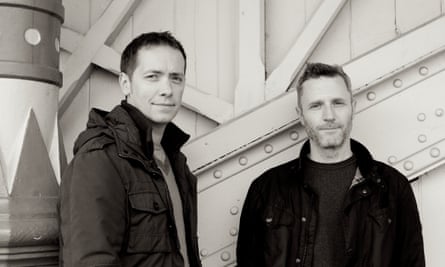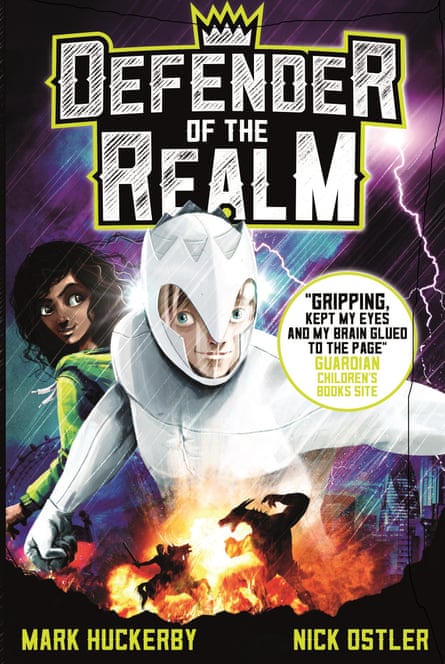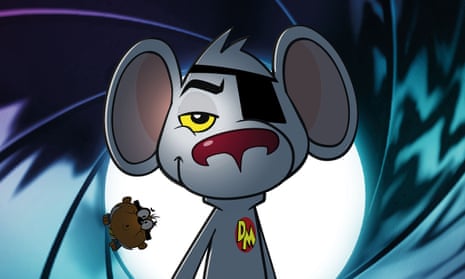What’s the difference between writing a script and writing a book? That was the question we were nervously asking ourselves when, after 16 years of scriptwriting for a living, we decided to embark on our first novel.
It couldn’t be THAT different, could it? Well, yes and no. We’d been lucky enough to be on the writing teams of some fantastic children’s TV shows, including Danger Mouse, Thunderbirds are Go and Shaun the Sheep. Those are some pretty fun sandboxes to be allowed to play in, so why the sudden desire to strike out into unknown territory? We’ve always believed that an idea will tell you what it wants to be.
Sometimes it’s TV, sometimes radio or even a movie – and we’d written all of those. But when we came up with Defender of the Realm – a reluctant young heir to the throne discovers that he is also a secret superhero charged with protecting the U.K. from a host of monsters and super-villains – it kept “telling us” it wanted to be a book. That way, we figured, we’d have the room to establish the world of our alternative Britain, the origin of our unique superhero’s powers, and an adventure with epic scope and endless possibilities. The only question was could we do it?

Writing scripts is a little like writing poetry. It’s all about economy of style – saying as much as you can with as few words as possible. Now, as we started writing our book, it felt like we had an ocean of words at our disposal. That was exciting and scary. Plus, there were TWO of us. Did writing partners even do books? Fortunately we had already been writing prose for years without realising it. Before a producer gives you the green light to start a script, you have to write something called a “treatment” – a few pages “selling” your story. We’d learned early on that a treatment had to be an entertaining read in its own right. Somewhere along the way we must have developed a joint “voice”, because our first Defender pages were coming out sounding surprisingly similar.
There were other novelties to get used to. Writing in the past tense! Scripts are written in the present – what’s happening before your eyes in the here and now. We had to retrain ourselves. Hearing what your characters are thinking! Wow, that felt like a real luxury. There is no faster way to get a red line through a script than writing “She thought to herself…” And voiceover narration is considered a cheap trick (unless you’re writing Danger Mouse and can use it for gags!). In fact, being able to peer inside our characters’ heads was such a novelty we had to be careful not to overdo it. But the best difference of all was not having to worry about a budget. Filming anything is expensive. But within the pages of a book you can go anywhere and do anything. Secret underground base beneath the Tower of London? Sure. Epic superhero battle destroys Stonehenge? Why not? Giant whirlpool swallows the Boat Race? Go for it. While you’re at it, why not have a volcanic eruption in the centre of Edinburgh? Not that we didn’t have a great editor, nudging us to cut, redraft and improve. But what we couldn’t believe was that there weren’t more people giving us notes. The high budgets in TV and film mean that a bunch of people have a say on your script. With the book we always felt like we were in the driving seat. We’d never had so much fun.
Even better, we discovered that many of the skills we’d picked up scriptwriting were very useful when it came to book writing. Hit the ground running, don’t let the writing get in the way of telling the story, never leave it too long till the next twist, think visually – all these turned out to be great rules of thumb for writing a middle grade adventure novel too.
The downside to all this creative freedom of course is that as an author you are much more in the spotlight than you are as a screenwriter. A book is still a collaboration – with your editor and every department of your publisher – but in the end it is YOUR name on the cover. There is no hiding amidst the scrolling credits at the end of the show if it isn’t a hit. The unexpected upside of being an author is that once your book is published you have the opportunity to go out and meet your audience one to one – at school visits, signings and book festivals. And there is nothing better than hearing a 10-year-old say they loved the world you created and asking when the sequel is out. Or having a parent tell you they found their child reading your book by torchlight under the duvet an hour after lights out! Just one more chapter…
Mark Huckerby & Nick Ostler’s Defender of the Realm is available from the Guardian bookshop.

